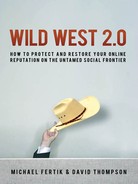millions of human-edited tags to provide a starting point for such a
quest. While Google is unlikely to violate its users’ trust by raiding
Facebook or MySpace for image tags, it would take only one less eth-
ical site to start a trend.
If facial recognition were to become more common, the impacts
on online reputation would be obvious. Right now, it is hard to find
many images of individuals. They may appear in many online pho-
tos, but if the photos are not captioned (many pictures aren’t) then
the subjects are effectively invisible to a search. If facial recognition
becomes more popular, a simple search for somebody’s name will re-
veal tens (or hundreds) of photos of them. This is especially true for
embarrassing photos of teenagers that have been spread to a wide au-
dience. Right now, many of these images have been distributed with-
out any identifying information; the victim of embarrassment is
effectively anonymous to all but his friends. But in a world of elec-
tronic facial recognition, the identities of many people in these pho-
tos will be revealed, with obvious potential for embarrassment
before potential employers, schools, and others. And, if sufficiently
scandalous, a risqué or drunk image might become the first thing
people see when searching for a particular person (see Figure 6-2).
Notes
1. “Whatever God wants, he keeps!” For a more full explanation, see Go:
http://wildwest2.com/go/601.
2. Unnamed Wikipedia editors, “Bill Gates,” via Wikipedia.org. Go:
http://wildwest2.com/go/602.
3. Yahoo! Site Explorer reported 16,937 links to Bill Gates’s biography page as
of September 2009.
4. Kofi A. Annan, “Walking the International Tightrope,” New York Times,
January 19, 1999. Go: http://wildwest2.com/go/603.
5. Press Release, “Searcher Moms—A Search Behavior and Usage Study,” Per-
formics. Go: http://wildwest2.com/go/604.
97Google Gone Wild: The Digital Threat to Reputation

6. Peter H. Lewis, “Digital Equipment Offers Web Browsers Its ‘Super
Spider,’” New York Times, December 18, 1995. Go:
http://wildwest2.com/go/605.
7. Bain News Service, “Harry Hooper (left) and Larry Gardner (center),
Boston AL (baseball)” 1912, via Library of Congress/Flickr.com (accessed
February 1, 2009). Go: http://wildwest2.com/go/606.
8. SeekFind. Go: http://wildwest2.com/go/607.
9. Technorati. Go: http://wildwest2.com/go/608.
10. Retreivr, via labs.systemone.at. Go: http://wildwest2.com/go/609.
Figure 6-2. Don’t let the Internet be your digital scarlet letter. Credit:
MorphoMir via Flickr.
98 Wild West 2.0
99Google Gone Wild: The Digital Threat to Reputation
11. Roi Carthy, “Pipl.com: People Search Engine So Good, It Will Scare Your
Pants Off,” TechCrunch (blog), January 29, 2009. Go:
http://wildwest2.com/go/610.
12. Commenter “Ann-Marie,” “Pipl.com: People Search Engine So Good, It
Will Scare Your Pants Off,” TechCrunch (blog) ( January 29, 2009, at 7:42
P.M. P.S.T.). Go: http://wildwest2.com/go/611.
13. Don Reisinger, “Picasa Refresh Brings Facial Recognition,” Te c h C r u c h
(blog), September 2, 2008. Go: http://wildwest2.com/go/612.
..................Content has been hidden....................
You can't read the all page of ebook, please click here login for view all page.
